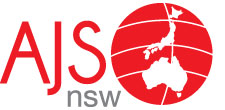Reports from recent AJS-NSW Events
Events 2014
The Rugby World Cup 2019: An Evening with Matt Carroll
Reporter: Steven Moe
October 23 2014
On 23 October a very interesting and entertaining evening was held with Matt Carroll who has been acting as the interim Chief Operating Officer for the Rugby World Cup 2019 to be held in Japan.
Matt began the evening with some stories about the RWC 2003 in Australia which he helped to organise. He commented that back in 2001 the organising committee had been given just 18 months’ notice that only Australia would host the event (rather than sharing it with New Zealand). This was in stark contrast with Japan which is being given many years to prepare. The fact that the 2003 RWC was a success showed that these large events can be organised quickly but there is a lot of work involved especially when holding the event in a “non-traditional” rugby playing country.
With still more than 4 years to go Matt was brought in to help lay the groundwork so that the event happens. While Japan had successfully won the bid from the International Rugby Board there was no budget prepared or plan for how the event would actually be organised. Japan will not benefit from the broadcast rights which are owned by the IRB and instead it will only receive income through ticket sales. In addition, a large fee needs to be paid by Japan to the IRB to host the event. Did Japan fully understand what it was getting into by bidding to host the world cup? Probably not - but a budget is now in place and there are 26 directors on the committee so work is much further progressed now.
Matt had some great insights into the story of the RWC 2019 so far. For example, he made the following points and included observations on where the opportunities for business may be:
· the event will be held over two months in September / October 2019 (this will be at a time which is not as hot as the summer months); · there will be 48 matches which take place in pools leading up to the semi-finals and finals which will all be held in the new National Stadium in Tokyo (which will also be the Olympic games venue); · the host nation needs to prepare the venues for use as Rugby pitches – this is no small task in Japan where most of the 11 or 12 venues will be outside major centres and often have running tracks around the playing field. Australia is good at using venues for multiple purposes so there are likely opportunities there for Australian companies to help with field conversions;
| · it is likely that some regional cities (such as Kumamoto in Kyushu) will host games as all sizes of venue will be required (eg Fiji vs Russia would need a smaller venue than Japan vs New Zealand). Opportunities will exist to help those regional cities prepare and upgrade their facilities; · it is projected that around 100,000 foreign visitors will go to Japan for the event and so there is a good opportunity for Japan’s tourism industry as in between games those arriving will have time to travel and see the sights. Companies organising tours from Australia will likely also benefit from this; and Just twelve months after the Rugby World Cup, Japan will host the Olympic and Paralympic Games. That is a different type of event as it involves multiple sports held throughout the daytime and is centred on Tokyo whereas the RWC is a single sport event held for short evening matches at venues across Japan. However, there will be certain aspects (such as transport and IT work) which will be needed for both events and also ex-prime minister Yoshiro Mori is the chair for the Olympics and is also the President of the Japan Rugby Football Union. The evening was of great interest for those wanting to hear about sport and Japan and the opportunities that may be presented by the RWC in Japan. Thanks are due to Peter Gibson who moderated the evening and interviewed Matt during the session. Previous Event Reports : Food Safety and Security - JAEPA July 2014 Tohoku - 3 Years On - March 2014 Nikkei Australians- November 2013 August 2013 - Japanese Investment Mark Willacy and others Jan - July 2013 |

